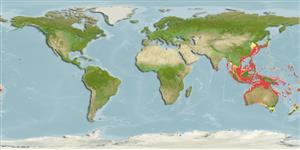Environment: milieu / climate zone / depth range / distribution range
Ecology
Marine; demersal; non-migratory; depth range ? - 130 m (Ref. 9790). Tropical
Indo-West Pacific: southern Japan, South China Sea, Philippines, Indonesia, northwest shelf of Australia and Andaman Sea.
Size / Weight / Age
Maturity: Lm ? range ? - ? cm
Max length : 17.0 cm TL male/unsexed; (Ref. 26587); common length : 12.0 cm TL male/unsexed; (Ref. 9790)
Dorsal spines (total): 9; Dorsal soft rays (total): 11 - 12; Anal spines: 0; Anal soft rays: 11 - 13. Infraorbital ridge smooth over front half of eye, serrated posteriorly. Suborbital ridge with a distinct smooth notch below middle of eye. Antorbital margin with 2 antrorse spines. Lower side of head unicarinate. Lateral line scales frequently 37 or 38, anterior scales 2-10 (usually 2-5) scales bearing spines. Iris lappet bearing numerous short branches with bifurcate tips. Upper surface of eye with a short, branched cirrus.
Taken by trawling over sand and mud bottoms to 130 m (Ref.9790).
Life cycle and mating behavior
Maturity | Reproduction | Spawning | Eggs | Fecundity | Larvae
Sainsbury, K.J., P.J. Kailola and G.G. Leyland, 1985. Continental shelf fishes of the northern and north-western Australia. An illustrated guide. CSIRO Division of Fisheries Research; Clouston & Hall and Peter Pownall Fisheries Information Service, Canberra, Australia. 375 p. (Ref. 3131)
IUCN Red List Status (Ref. 130435: Version 2024-1)
Threat to humans
Harmless
Human uses
Fisheries: of no interest
Tools
Special reports
Download XML
Internet sources
Estimates based on models
Preferred temperature (Ref.
123201): 20.8 - 28.9, mean 27.6 °C (based on 1408 cells).
Phylogenetic diversity index (Ref.
82804): PD
50 = 0.5039 [Uniqueness, from 0.5 = low to 2.0 = high].
Bayesian length-weight: a=0.00871 (0.00489 - 0.01552), b=2.90 (2.74 - 3.06), in cm total length, based on LWR estimates for this species & (Sub)family-body (Ref.
93245).
Trophic level (Ref.
69278): 3.6 ±0.0 se; based on diet studies.
Resilience (Ref.
120179): High, minimum population doubling time less than 15 months (Preliminary K or Fecundity.).
Fishing Vulnerability (Ref.
59153): Low vulnerability (10 of 100).
